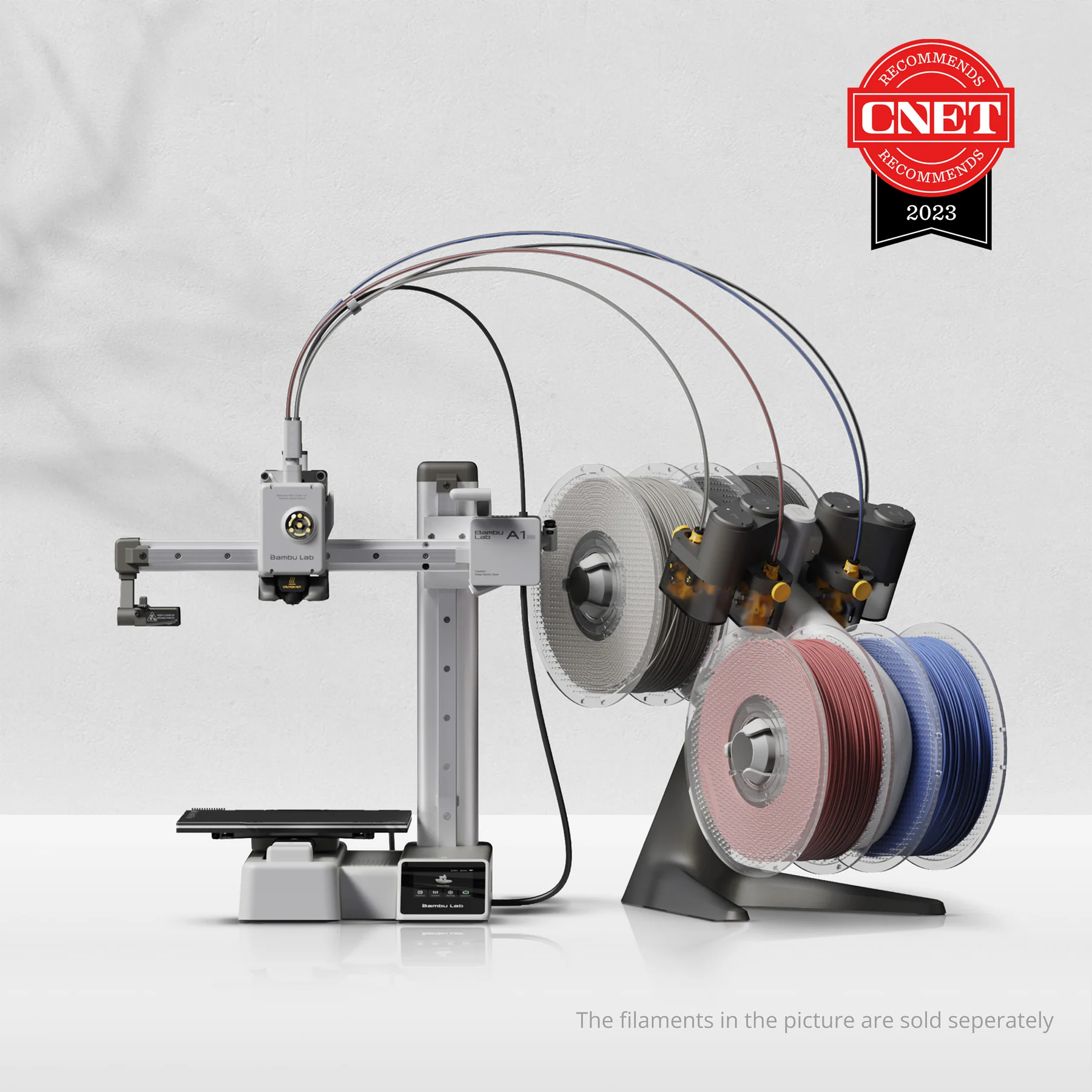Compare KP3S PRO V2 vs A1 Mini
Comparison between the best 3D printers
Choose the best 3D printer at the best price. The cheapest 3D printers are here.
Buy a 3D printer here with 3D Fila.
 |
 |
|
| Model | KP3S PRO V2 |
A1 Mini |
| Printing Material | Filament | Filament |
| Buy Filament for Kingroon KP3S PRO V2 | Buy Filament forBambu Lab A1 Mini | |
| Estimated price | $229,00 | $549,00 |
| Manufacturer | Kingroon | Bambu Lab |
| Release Year | 2024 | 2023 |
| Print Volume [mm] | 220x220x250 | 180x180x180 |
| Printer Size [mm] | 420x400x450 | 315x347x365 |
| Weight [kg] | 12,6 | 5,5 |
| Power Loss Recovery | NO | YES |
| Enclosed printer | NO | NO |
| Bed Leveling | Automatic | Automatic |
| Filament End Sensor | NO | YES |
| Bed type | Heated | Heated |
| Power supply system | Direct Drive | Direct Drive |
| Standard nozzle | 0,4 | 0,4 |
| Maximum Nozzle Temperature [°C] | 260 | 300 |
| Maximum Bed Temperature [°C] | 100 | 80 |
| Maximum printing speed [mm/s] | 350 | 500 |
| Filament holder | YES | YES |
| Camera for supervision | NO | NO |
| Recommended filaments | PLA, PETG, TPU | PLA, PETG, TPU, PVA |
| Recommended slicers | Cura, Orca Slicer | Bambu Studio, Super Slicer, Cura, Prusa Slicer, Orca |
| Maximum Resolution [mm] | 0,01 | 0,1 |
| Processor | 32-bit Silenciosa | |
| Display | LCD Mono | Touchscreen 2,4'' |
| Power Supply | 300 W | 150 W |
| Connectivity | USB-C / MicroSD / Ethernet | Wifi, Bambu bus, Cartão SD |
| Operating systems | Windows, Mac, Linux | Windows, Linux, Macbook |
| Date of registration in the system | 2025-03-18 | 2024-04-10 |
| Release date | 2024 | 2023 |
| Extra features | The Kingroon KP3S Pro V2 is a high-speed FDM 3D printer with Klipper firmware, ensuring fast and precise prints. It features linear rails on all axes, a Direct Drive extruder with a 9.5:1 gear ratio, and an efficient ceramic heater. It includes an inductive sensor for automatic bed leveling, a PEI magnetic bed, a built-in accelerometer for vibration calibration, and Wi-Fi, Ethernet, and USB connectivity for remote control. | The Bambu Lab A1 Mini stands out not only for its impressive speed and automatic calibration, but also for its multi-color printing capability thanks to AMS Lite. This innovative system makes multi-color printing easy, making it accessible to everyone. AMS Lite, specific to the A1 Mini, supports up to four different materials simultaneously, providing creative freedom without complications. With comprehensive sensors for energy monitoring and recovery, a camera for timelapses and Wi-Fi control, the A1 Mini and AMS Lite together offer an intuitive and advanced 3D printing experience, ideal for materials such as PLA, PETG and TPU, and designed for simplicity and fast maintenance with quick-change nozzles. |
| Support for multiple colors and materials (AMS and CFS) | NO | YES |
Notes * |
||
| Cost-benefit | 7 / 10 | 7 / 10 |
| Hardware | 0.8 / 10 | 4.2 / 10 |
| Tela | . | . |
| Print volume | 3 / 10 | 3 / 10 |
| Performance | 3 / 10 | 4 / 10 |
Conclusion |
| In conclusion, when comparing the KP3S PRO V2 and the A1 Mini, both 3D printers have their unique strengths and weaknesses, making them suitable for different types of users and applications. The KP3S PRO V2, which is the more affordable option, offers a larger print volume and a higher maximum printing speed. It is designed for users who prioritize speed and a larger build area for their projects. Its features, such as automatic bed leveling and a robust connectivity option, also enhance its usability, making it a solid choice for those new to 3D printing. On the other hand, the A1 Mini, despite its higher price point, comes equipped with advanced features like multi-color printing capability through its AMS Lite system, comprehensive sensors, and a touchscreen interface for a more user-friendly experience. The added benefits of power loss recovery and connectivity options such as Wi-Fi provide a modern approach that accommodates various printing needs. Ultimately, if budget is a primary concern and larger print volume is needed, the KP3S PRO V2 may be the better choice. However, for users seeking advanced features and a more seamless printing experience, the A1 Mini justifies its premium price with cutting-edge technology and usability benefits. Each printer caters to specific preferences, so the choice should align with individual requirements and expected use cases. |

